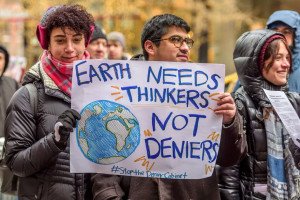
The first week of the Trump administration was already full of tension at many science-producing federal agencies, where transition uncertainties and new communication and funding directives made scientists fear their work could be suppressed or even canceled by politicians.
But scientists are already mobilizing — and fast.
“Scientists worldwide have been alarmed by the clear anti-science actions taken by the Trump administration,” Caroline Weinberg, an organizer of an upcoming “Scientists’ March on Washington,” told Vox in an email.
The exact details of the march — specifically when it will occur — have not been set. Weinberg says organizers will be meeting this weekend to discuss that. But interest in the event has exploded. The group set up a Facebook page Tuesday, and as of Thursday afternoon it has already attracted around 600,000 members. And the organizers say there will be satellite events in many cities besides DC.
The marchers’ demands will be simple: Accept scientific facts, don’t suppress them. And don’t offer “alternative facts.” As the march’s website states:
There are certain things that we accept as facts with no alternatives. The Earth is becoming warmer due to human action. The diversity of life arose by evolution. Politicians who devalue expertise risk making decisions that do not reflect reality and must be held accountable. An American government that ignores science to pursue ideological agendas endangers the world.
Elsewhere, too, scientists are taking the first steps to action. At the Atlantic, Ed Yong reports on 314 Action, a group that’s “the science version of Emily’s List,” which is working to recruit people with science degrees to run for public office (though they are only currently recruiting Democratic candidates). As of his report, 400 people with scientific backgrounds had already signed up to be recruited.
“As we’ve seen in the last week, there is an assault on science at the hands of politicians who don’t have scientific or technical backgrounds and don’t understand the lasting impacts of not acting immediately on climate change,” Shaughnessy Naughton, a former congressional candidate who now runs 314, wrote in an email. “Scientists are underrepresented in our [Congress], in our state legislative houses and on school boards.”
By trying to suppress scientists, Trump may actually embolden them. Just like when Trump was dismissive of women’s issues, thousands showed up at his new doorstep.
The case for scientists getting political
It’s possible these efforts could backfire and just make science even more of a polarizing topic. And make no mistake: The human brain does a great job of discounting facts that belong to the “other team,” no matter how compelling the evidence is.
But science has always been political (just look at the Environmental Protection Agency during the Bush years, or the “war on science”in Stephen Harper’s Canada). Making informed decisions and creating programs and policies that can actually be effective requires mustering scientific evidence, not ignoring it. And that’s a compelling case for scientists to get their voices heard.
“Scientists are much more comfortable engaging in the generation of knowledge apart from the political fray,” Sandro Galea, dean of Boston University’s School of Public Health, says. “But we’re entering a time where science is being dragged into the political fray and has no choice but to engage.”
“Ultimately, a healthy democracy depends on science,” Jonathan Foley, the executive director of the California Academy of Sciences, writes at Scientific American. “The pursuit of truth, having an informed citizenry, and the free and open exchange of ideas are all cornerstones of our democracy.” And who else is better equipped to ensure America makes decisions based on the bedrock of fact than the people charged with discovering those facts?
If there’s one more compelling reason why scientists should now be feeling like they should enter the political fray, it’s this: People who are scientifically curious tend to be better political thinkers.
“If there’s a way to make people more impervious to [politically motivated reasoning],” Dan Kahan, a Yale psychologist, says, “it’s improving science curiosity.”
Kahan just published a big new study that finds the more curious you are about science, the more likely you are to be immune to partisan bias on questions about global warming, fracking, or other politicized issues. That is, a scientifically curious Republican is more likely to acknowledge the truth about the consensus on climate change than a Republican who is not scientifically curious.
Curious people, Kahan explains, are more likely to seek out information that contradicts their preconceived beliefs. They’re more likely to engage in scientific media. And they’re less likely to be stubborn on politically charged topics in science. Wouldn’t it be nice to have more of that in Washington?
Curiosity, he says, doesn’t even have to go hand in hand with deep scientific knowledge. Which is reassuring. All it takes to avoid the pitfalls of biased thinking is a sense of wonder.
Courtesy: Vox.com

